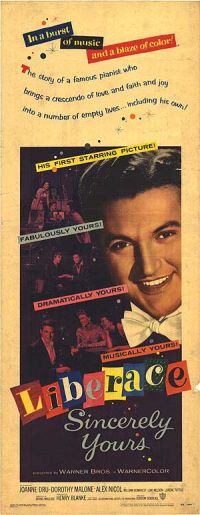 Liberace’s brief stint as a leading man was preordained to be short lived. Loathed by critics of both cinema and music, the flamboyant Liberace was more entertainer than actor and could hardly carry a feature length film. That’s why Sincerely Yours (1955), his first and only starring vehicle, spends most of its nearly two-hour runtime with Liberace at the piano. Yet even in a lesser performance such as this, he’s a captivating cultural figure and undeniably fun, and Sincerely Yours is a must watch for Liberace fans and lovers of 1950s musical extravaganzas.
Liberace’s brief stint as a leading man was preordained to be short lived. Loathed by critics of both cinema and music, the flamboyant Liberace was more entertainer than actor and could hardly carry a feature length film. That’s why Sincerely Yours (1955), his first and only starring vehicle, spends most of its nearly two-hour runtime with Liberace at the piano. Yet even in a lesser performance such as this, he’s a captivating cultural figure and undeniably fun, and Sincerely Yours is a must watch for Liberace fans and lovers of 1950s musical extravaganzas.
Released to coincide with Steven Soderbergh’s biopic Behind the Candelabra, Warner Archives has released Sincerely Yours as a MOD DVD in a lovely restored transfer. Long out of print on VHS and almost never shown on television, Sincerely Yours has been labeled, probably by people who had never seen the film, as “campy” and awful. In truth, it is neither.
Sincerely Yours is an updated remake of the George Arliss film The Man Who Played God (1932), which long-time SBBN readers will remember as bizarre, wrong-headed and thoroughly freakish. In the 1932 film, a master pianist is rendered deaf by an explosion, losing his ability to play music, leading him to becoming bitter and reclusive. Eventually, he learns to read lips and parlays this into a strange obsession with spying on strangers in the park below his penthouse. The Liberace version follows a similar plot with only moderate variations, all an improvement on the Arliss version. The thin plot is far more entertaining when used as a foundation for gorgeous WarnerColor and musical setpieces.
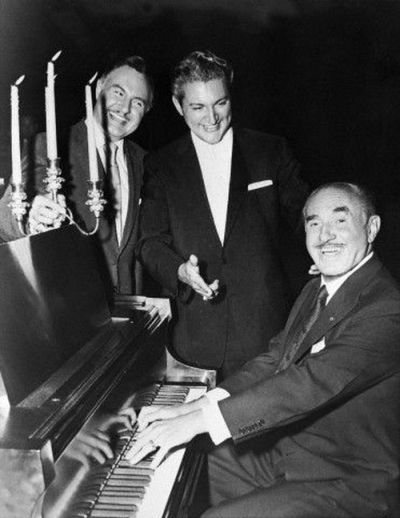 Original caption: July 27, 1955, Hollywood, CA: Piano impressario Wlasziu Liberace takes a back (well almost) seat and lets film producer Jack L. Warner tickle the ivories as they took time out for a little horse play on the set of “Sincerely Yours”, an International Artists, LTD. production. Holding the candelabrum is George Liberace, brother of the pianist.
Original caption: July 27, 1955, Hollywood, CA: Piano impressario Wlasziu Liberace takes a back (well almost) seat and lets film producer Jack L. Warner tickle the ivories as they took time out for a little horse play on the set of “Sincerely Yours”, an International Artists, LTD. production. Holding the candelabrum is George Liberace, brother of the pianist.
Sincerely Yours began filming on Liberace’s 36th birthday in 1955, the same year Lee opened at the Las Vegas Riviera as the highest-paid entertainer in the city. Already popular due to the success of his syndicated television show, a series of performances at Madison Square Garden in 1954 solidified his superstar status. Though a pop culture staple by this time, he was also the subject of plenty of jokes about his masculinity, his flashy style and penchant for playing popularized versions of classical tunes. But turning himself into a commodity was entirely the point: “I don’t give concerts,” he once said. “I put on a show.”
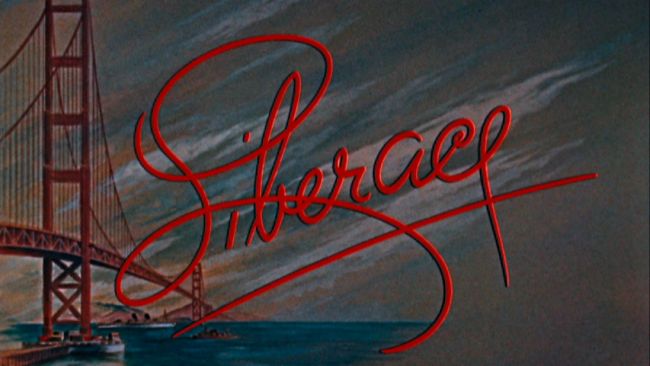 Liberace’s credit in Sincerely Yours. Warners knew how to do fabulous.
Liberace’s credit in Sincerely Yours. Warners knew how to do fabulous.
Filming for Sincerely Yours was not without problems. Mario Lanza, on contract to Warner Bros., took it upon himself to provide unsolicited advice to Liberace, making him even more nervous than he already was. Lanza was also famous for his pranks and practical jokes, which reportedly delighted the crew while irritating the cast. And Lee must have known early in production that he was more persona than actor, suited for stage shows and television but not the big screen.
His experience on Sincerely Yours was a formative one, however, in developing his fabulous fashion sense. Lee was known for wearing a white tie and tails or spangly jackets during his shows, but famous Hollywood fashion designer Sy Devore objected to this style. As he created Liberace’s wardrobe for the film, he guided him away from the “droopy” jackets he had been wearing. In the mid 1950s, the shoulder pads and loose jacket look was very in with rock and rollers such as Chuck Berry, Elvis, and Jerry Lee Lewis. Devore, however, saw Liberace as no longer inspired by the outsized antics of rockers but being his own unique creation, and started the entertainer down a path that would end in lavender-dyed furs and jewel-encrusted suits.
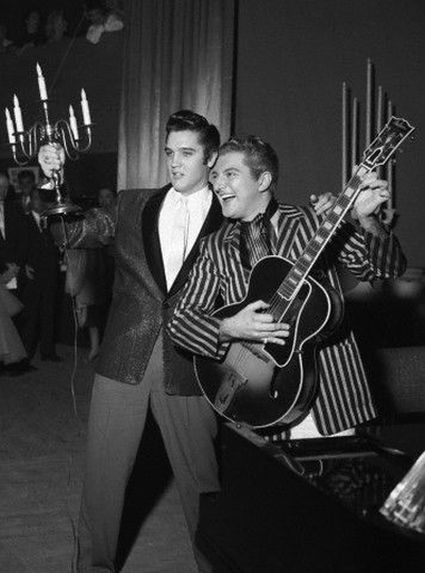 Original Caption: Nov 16, 1956, Las Vegas, Nevada, USA: Liberace strums out “Blue Suede Shoes” for Elvis Presley at Liberace’s opening night at the Riviera Hotel. Presley, shown holding a candelabra trademark of Liberace, was a guest at the opening and joined the pianist on stage for a mix-up jam session.
Original Caption: Nov 16, 1956, Las Vegas, Nevada, USA: Liberace strums out “Blue Suede Shoes” for Elvis Presley at Liberace’s opening night at the Riviera Hotel. Presley, shown holding a candelabra trademark of Liberace, was a guest at the opening and joined the pianist on stage for a mix-up jam session.
Liberace trained as a classical pianist and by the age of 20 was touring and performing with large city symphonies, and receiving solid reviews. Those who later slammed Liberace as an inept pianist were likely criticizing his performance style rather than musicianship. For instance, Kevin Kopelson in his book Beethoven’s Kiss notes Liberace omits the left-hand octaves in a Chopin polonaise performed in Sincerely Yours, acknowledging that it’s done for effect — it’s the moment where Liberace’s character Anthony Warrin loses his hearing, and he struggles just to finish the song so he can run off stage — but Kopelson also insists that it was done because Liberace knew he simply could not handle the piece properly.
It’s a ridiculous claim, of course. Any well-known classical piece could have been used for that moment. There was no need to use a number Liberace “couldn’t” perform, and due to the deliberate rush-through required for the character, it’s impossible to know if Liberace could have performed it properly or not. That said, Tchaikovsky’s Concerto B Flat Minor, Op. 23, which is played straight for the film, seems just out of Liberace’s reach, his focus still on achieving technical accuracy and with no emotional content whatsoever.
It should be noted that Sincerely Yours doesn’t rely on stunt pianists or dubbing to create a cleaner, more perfect performance. The musical numbers were recorded live during filming, and the synchronization of Liberace’s playing matches perfectly with the sound in a way that other mid-50s musicals simply could not achieve. That meant the occasional musical misstep was preserved on film; for a Warner Bros. musical, it was good enough, even if it wouldn’t have passed muster on the recital circuit.
Good enough wasn’t exactly a formula for success. Various sources, including our beloved Robert Osborne, noted that after an initial wave of publicity focusing on Liberace, Warner Bros. changed their tactics and publicized the costars instead, downplaying Lee’s starring role. The film still crashed at the box office, and though Liberace took a PR hit from the fiasco, he recovered quite nicely with stage shows and a long-running television series. Lee may have been disappointed, but his humor once again won out; in an interview, he described Sincerely Yours as “my big try for stardom in the movies, but nobody noticed it or me. Maybe I should have worn my candelabra on my head, Carmen Miranda style.”
Leonard Maltin gives the movie one of his infamous “BOMB” ratings, focusing most of the snippet in his Classic Movie Guide on Lee’s brother George being music adviser for the film. But at least Maltin merely calls it “campy,” while most other reviewers laugh at 1950s Liberace fans being clueless about Lee’s sexuality. Yet I maintain that he was not nearly as obvious as most people claim, at least not in 1955. If his screen presence seems fey, I would like to direct you to the butt-swingin’ bandleader Bob Wills, or one Johnny “Scat” Davis whose performance of “Hooray for Hollywood” anticipates camp king Stephen Stucker by a few decades. What we see as “obviously gay” nowadays simply was not read the same way many decades ago.
It’s a case of people using their modern day knowledge of Liberace, the over-the-top kitsch festooned with ostrich feathers and furs died a rainbow of colors, to tint their perception of Lee earlier in his career. There is more than a little homophobia and sexism involved, as well. Homophobia because Liberace, though closeted, was gay, and sexist because his act appealed to middle-aged females, a demographic the U.S. culture has derided for decades. Plentiful scorn is directed at these “laughably oblivious” women for thinking Liberace handsome or talented when he had no sexual interest in them. A male performer who appeals to middle-aged American women is often criticized as less important and less talented, someone who can’t attract hot young things and so goes for the sexual low-hanging fruit: middle-aged women, who are seen as gullible, desperate and silly.
If Liberace cared about this cultural quirk, he did so, as he once said, “all the way to the bank.” Those supposedly clueless audiences were in on his shtick from the start, anyway. As depicted in Behind the Candelabra, his conspicuous consumption of his fans’ money was hardly hidden; hell, it was a selling point. “Take a good look,” he’d tell the audience while flashing his jewels. “You paid for it.”
That version of Liberace had not yet arrived in 1955, though the beginnings of what would become his infamously campy act are already there: a single diamond-studded ring here, a beaded jacket there, an ostentatious flourish at the end of a Beethoven piece. There is a lengthy show segment in Sincerely Yours with Lee wooing a table of adorable 50-something ladies from out of town. It’s a remarkable moment because the women are not treated unkindly, at least not by Liberace, who is charm personified, though the film itself doesn’t quite match its star’s demeanor. Clad in overdone evening clothes that signify them as rubes and lingering on their falling faces when they see him kiss his girlfriend, one realizes Hollywood had one opinion on this demographic, Liberace quite another.
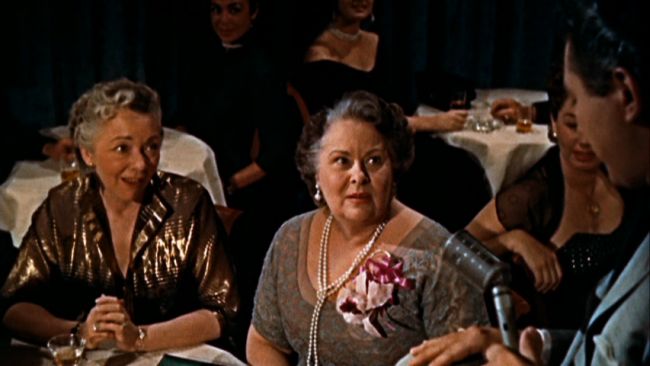 Actress Lilian Culver as a starstruck fan. I love her, and also, not coincidentally, probably look exactly like her when at a concert, though I can’t rock a corsage as well as Lilian could.
Actress Lilian Culver as a starstruck fan. I love her, and also, not coincidentally, probably look exactly like her when at a concert, though I can’t rock a corsage as well as Lilian could.
In Sincerely Yours, Anthony Warrin (Liberace) is a popular pianist who performs his way to Carnegie Hall, fighting critics who claim his popularized versions of classics are low-brow and unworthy of praise. Anthony is loved by his capable manager Marion (Joanna Dru) but is oblivious to her feelings, instead wooing the beautiful Linda Curtis (Dorothy Malone). Warrin soon suffers from gradually-increasing spells of hearing loss, sure to become permanent if he doesn’t submit to surgery in an attempt to correct this congenital condition. This surgery is dangerous, and could cause permanent hearing loss or worse, so he demurs while learning to communicate by reading lips. He avoids Linda during this time, and she takes up with composer Howard Ferguson (a strangely angry Alex Nicol), though the entire issue is glossed over in the film as he focuses on re-learning to compose music and helping a young child who needs an operation.
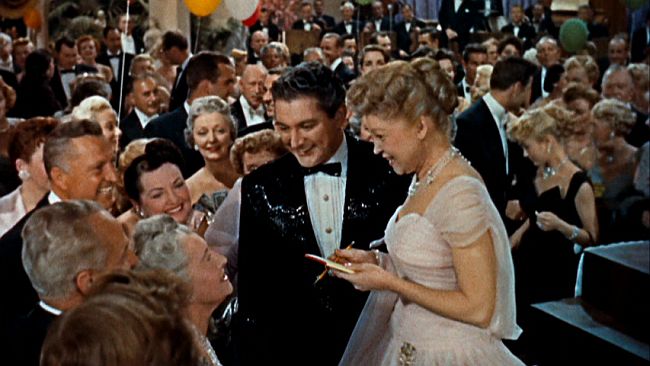 A true showman, covered in beads courtesy a top Hollywood designer, not precisely a rock star but made in the image of one, the highest paid entertainer in Vegas, basking in the adoration of women, given a starring role in a film he was ill-equipped to carry on his own… now who does he remind me of?
A true showman, covered in beads courtesy a top Hollywood designer, not precisely a rock star but made in the image of one, the highest paid entertainer in Vegas, basking in the adoration of women, given a starring role in a film he was ill-equipped to carry on his own… now who does he remind me of?
Actor Alex Nicol complained briefly about Sincerely Yours in an interview decades later, claiming he demanded double the salary because he didn’t want to be in a film he couldn’t explain to his friends or children. It’s an odd statement until you realize he’s talking about being unable to explain Liberace, not the film; it’s homophobia, pure and simple, and his ludicrous claim that the studio needed him so badly they paid him double his usual salary because they couldn’t get anyone else is hetero posturing and self-aggrandizing retcon. Nicol’s role is superfluous, and any actor of his age could have played the part.
Andrew Sarris famously described director Gordon Douglas as sympathetic because he had “lived through Liberace [and] deserves all our compassion, particularly when he didn’t shirk his job despite the utmost provocation.” What possible “provocation” could Lee have provided that was worse than, say, anything Douglas encountered during Zombies on Broadway (1945) or The Sins of Rachel Cade (1961)? Liberace wasn’t the worst actor Douglas ever worked with, nor was he the only gay man Douglas directed, but he was the most overtly gay, thus the alleged “provocation.”
Unfortunately, the little that has been written about Sincerely Yours is positively glutted with this sort of thing. Because Liberace is seen as camp, the film is assumed to be more campy than it is. There are hints of camp here and there, of course, because it’s a film starring Liberace, and because everything Gordon Douglas directed contained at least 5.4% camp by volume. But it is not a campfest, and those hoping for some bizarre, sequin-spangled disaster will be disappointed. If Sincerely Yours commits any sin, it’s the sin of boredom, but fortunately not through the entire film. Liberace is uncomfortable during several scenes, though sometimes acquits himself at least as well as the stalwart character actors who populate the rest of the film, and in key scenes manages quite well. It’s the moments where Lee gets to do bits of his stage show and talk to the audience that Sincerely Yours finally succeeds at being a full entertainment experience.
SOURCES:
Liberace Extravaganza! by Connie Furr Soloman and Jan Jewett
The Official Razzie Movie Guide: Enjoying the Best of Hollywoods Worst by John Wilson
Named and Shamed: The World’s Worst and Wittiest Movie Reviews by Christopher Tookey
Collected Interviews: Voices from Twentieth-Century Cinema edited by Wheeler W. Dixon
Liberace: An American Boy by Darden Asbury Pyron
The American Cinema: Directors and Directions, 1929-1968 by Andrew Sarris

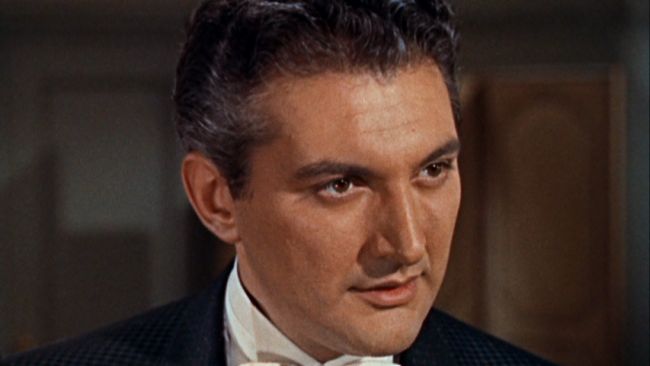
I’ve been (morbidly?) curious about this one for years, and hoping there was more to it than the condescending snark that’s usually attached to any mention of it. Thanks for the objectivity.
I don’t know that I buy into the notion that people were different or less canny back then, and there was certainly enough talk of “Lavender Lee” in scandal sheet articles about Liberace to have kept him from being completely closeted to the public at large even then…but I agree that it may not have been as easily recognized – or politicized – as it would be these days. There was a long tradition of mannered, flamboyant types in show biz before Liberace’s time (as well as contemporaries like “The Continental”) that he seemed to be a part of, continuing on through performers like Paul Lynde and Charles Nelson Reilly – who were obviously gay, but it didn’t seem to affect their ability to find work or a following. They were considered entertaining characters, and the fact of their sexuality passed quickly through the backs of people’s minds without it impacting on the effectiveness of their performances one way or the other.
It was a little before my time, but I know my mother used to watch Liberace’s show in the ’50s and my impression was that she primarily thought of him as an entertaining guy who was a little off the beaten path, but so charming that nothing else really seemed to matter.
I think that charm is what comes through in your review, and I really appreciated that.
Thanks James, I appreciate it!
I don’t necessarily think people were clueless or oblivious back then, just that what is considered “acting gay” is so entirely subjective that people who smirk and say Lee’s fans were idiots are, ironically, the ones who are clueless. And like you said, it would never have occurred to them that people knew and didn’t care because they found Liberace entertaining, charming and fun.
So few people can write about Liberace without making fun of him. I’m so glad you did, and with solid research to boot.
Thanks KC! I remember him from the 70s and 80s where he didn’t care (or didn’t SEEM to care) if he was made fun of, as long as he was still entertaining, but I don’t personally find him an inherently ludicrous cultural figure. Outsized of course, but geez, who isn’t nowadays?
I’m not sure how ridiculous Kopelson’s claim was. Liberace would often fudge or outright omit some of the more technically challenging movements of the pieces he would perform. For the most part, his audience wouldn’t know, and wouldn’t care if they did.
Right, but like I said, that’s an entirely different performance situation. That’s Liberace “putting on a show” rather than playing a recital. In the film, the plot required him to rush through and simplify the piece he was playing, just to get off stage because he had lost his hearing. Kopelson using that as an example of him being unable to play music doesn’t make sense; what Kopelson needed was an actual example from a TV show or stage performance, not an example where the song was going to be modified no matter what because the plot required it.
Besides, given the reviews of Liberace’s earlier recitals, it seems he did perform competently on the recital circuit earlier in his career.
Greatly enjoyed this post– as usual, it was balanced, fair, compassionate, well-researched and exceptionally well-written. 14 years ago when I moved to Arizona, I took up an interest in Westerns, and from time to time would visit sites in Tucson, Sedona and Monument Valley where some of the all-time classics were made. Now that I’m moving to Vegas, I’m developing an interest in cultural icons like Liberace. Go figure! :)
Thanks Brian! I was in Vegas last year — it is a beautiful place. Best of luck with the move!
Pingback: The Last Films Blogathon: Douglas Shearer and Her Twelve Men (1954) - She Blogged By Night
Pingback: Warner Archive: The Loved One (1965) - She Blogged By Night